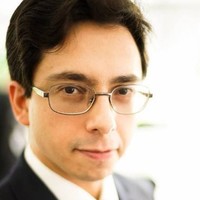
Alexander R. Cohen
- Courses3
- Reviews15
- School: John Jay College of Criminal Justice
- Campus:
- Department: Government
- Email address: Join to see
- Phone: Join to see
-
Location:
524 W 59th St
New York, NY - 10019 - Dates at John Jay College of Criminal Justice: April 2005 - March 2008
- Office Hours: Join to see
Biography
John Jay College of Criminal Justice - Government
Writer and Editor
Writing & Editing
Alexander R.
Cohen
Toledo, Ohio
As an editor, I make sure written works use good English -- and make sense.
As a philosopher-journalist, I strive to help readers understand legal, political, and social issues.
Experience
The Toledo Blade
Editorial Writer
I found topics, proposed positions, and drafted editorials.
I proofread the editorial page.
Occasionally, I wrote columns.Freelance
Freelance Editor and Philosopher-Journalist
I'm returning to freelance work. In the past, I've edited or proofread news, opinion, legal scholarship, fantasy fiction, and humor.
I've written hundreds of pieces. Many of them have been opinion, but I've also done straight reporting, rewritten news, and written substantial essays on law and philosophy.This Is True
Writer
If reporting begins with who did what, This Is True begins with who did WHAT?! Building on reporting by the mainstream media, we draw out what's weird, funny, thought-provoking, or, occasionally, poignant.
I find stories I think would suit This Is True, rewrite them briefly and entertainingly, and add taglines to make you laugh or think.
The publication is available in both free and premium email editions: www.thisistrue.com.Nonprofit client
Legal Consultant
The American Law Institute was revising the article of its Model Penal Code on rape and related crimes. As a consultant to an advocacy nonprofit, I analyzed the official proposal, identifying its differences from the existing article and highlighting its flaws. In particular, I argued that by multiplying offenses, the proposal gave prosecutors too much power.
Center for the Individual
Founder and Executive Director
In my research and writing, I focused on the criminal process from a philosophical perspective. I wrote a major essay on the right to a trial, and I blogged on that issue. I lectured on the 800th anniversary of Magna Carta, covering (among other issues) the reasons trial by jury is valuable.
The Center was intended to give me a way to do philosophical work -- including both in-depth essays and commentary for popular audiences -- on legal, political, and moral issues full-time. To make that happen, I would have had to raise enough money to pay myself a full-time salary. I did not meet that goal, so I decided to suspend the Center's operations, a suspension that became permanent when I found a job in journalism.
Education
University of Virginia
Doctoral studies (did not complete)
Philosophy
I explored the justification of criminal punishment and other issues in moral and political philosophy. I studied both ancient and modern philosophers, developing a particular specialty in Aristotelian ethics. While at U.Va., I served two terms on the Honor Committee, where I helped adjudicate cheating cases and achieved a major reform that made the Honor System more transparent. In support of this work, I extensively researched the federal Family Educational Rights and Privacy Act. Eventually I decided that I did not want an academic career and, therefore, would not complete my dissertation.University of Virginia
As a member of the Committee, I was responsible for a major reform: the creation of the system of public summaries that allows students to know how the Honor System's prohibition of lying, cheating, and stealing is being applied in particular cases. I also sat on preliminary or trial panels to help adjudicate numerous cases.City University of New York
Master of Arts (M.A.)
Philosophy
I enrolled at the CUNY Graduate Center to pursue a Ph.D. in philosophy, but decided to take the M.A. and transfer to the University of Virginia. While at CUNY, I took courses on the philosophy of law, political philosophy, and ethics. Much of my work centered on Aristotle.University of Pennsylvania
Doctor of Law (J.D.)
Law
I studied criminal and constitutional law. I earned membership on the Law Review and graduated magna cum laude and Order of the Coif. My criminal-law coursework included classes on criminal procedure, juvenile justice, and the justification of criminal law. My constitutional-law courses (other than criminal procedure) mainly focused on the First Amendment.


